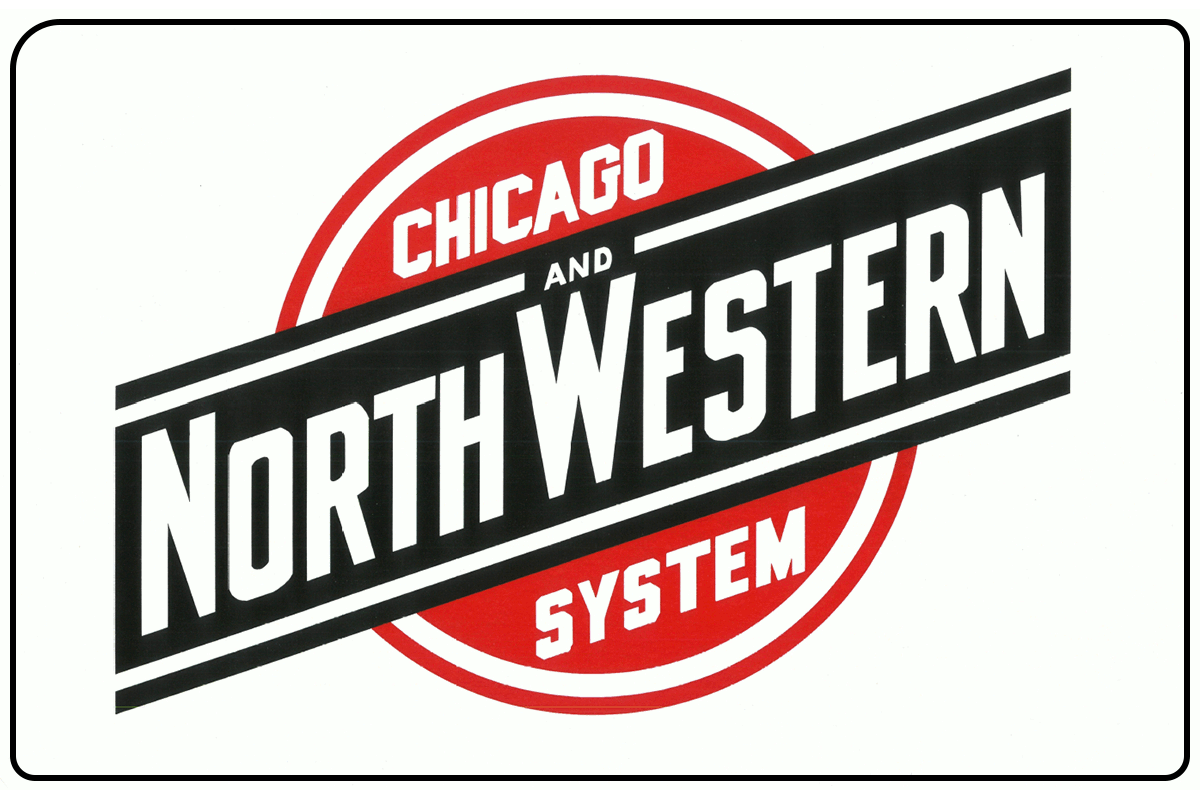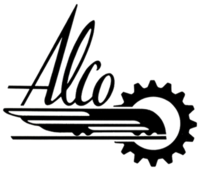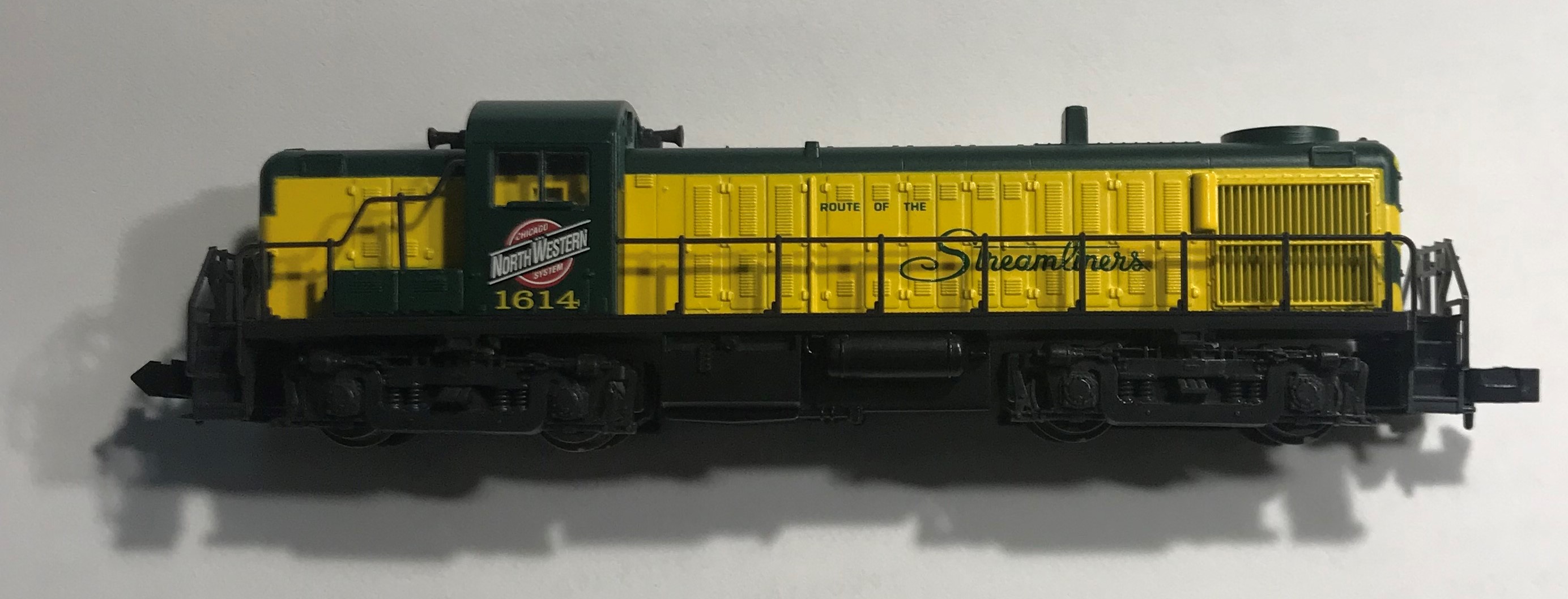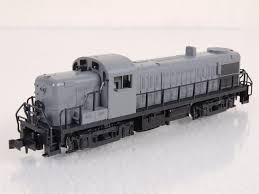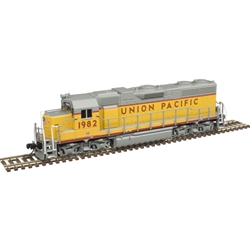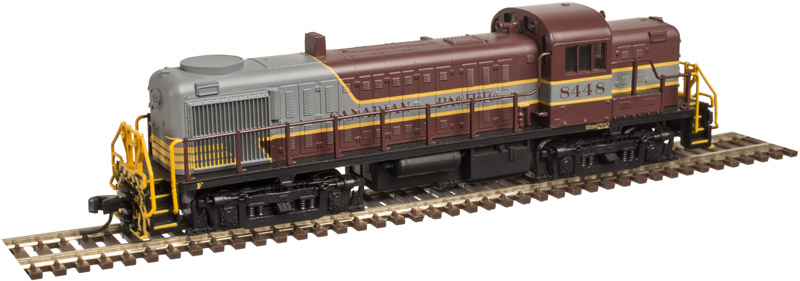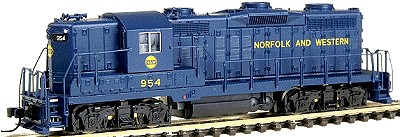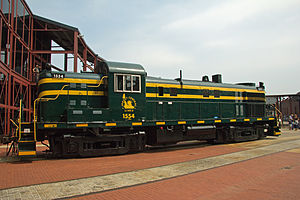Model Information: Atlas introduced the Kato-produced RS-3 in 1983. They followed up with the RSD-4/5 in 1987 (also Kato-produced). Kato also recyled the chassis for use in their RS-11. Atlas redesigned the RS-3 in 1999 and production moved to China. The models were again modified in 2001 (RS-3) and 2004 (RS-4/5) and from then on featured Atlas "Slow-Speed" motors. The Chinese RS-3 and RSD-4/5 share the same internal mechanism.
The early releases were the first locomotive produced by Kato for Atlas. It was vastly superior to the earlier models produced by Roco for Atlas. The combination of the split-frame design, directional lighting and 5-pole motor with bearing blocks to hold the worm gear in place made it the first "modern" N-Scale design for a North American locomotive. The 2001 Chinese version is very similar to the Kato version.
The Atlas-China version features: Golden-white LEDs; Directional lighting; Separately-applied painted handrails (where appropriate); Blackened metal wheels; Scale Speed™ motor and Accurate painting and printing.
The early releases were the first locomotive produced by Kato for Atlas. It was vastly superior to the earlier models produced by Roco for Atlas. The combination of the split-frame design, directional lighting and 5-pole motor with bearing blocks to hold the worm gear in place made it the first "modern" N-Scale design for a North American locomotive. The 2001 Chinese version is very similar to the Kato version.
The Atlas-China version features: Golden-white LEDs; Directional lighting; Separately-applied painted handrails (where appropriate); Blackened metal wheels; Scale Speed™ motor and Accurate painting and printing.
DCC Information: Unfortunately the one modern feature this model lacks is a single-lightboard design to permit a "drop-in" decoder board installation. The split-board requires some soldering and careful installation to upgrade even the most modern edition of this locomotive to DCC. Special split decoders are available to convert these models to DCC. Some soldering required. TCS makes the 1278-CN which works pretty well.
TCS CN decoder installation shown on Brad Myers' N-scale DCC decoder installs blog and on TCS website.
A classical wired DCC decoder detailed installation was available on maritime.dns.ca/mgerrits/trains (website no longer exists).
TCS CN decoder installation shown on Brad Myers' N-scale DCC decoder installs blog and on TCS website.
A classical wired DCC decoder detailed installation was available on maritime.dns.ca/mgerrits/trains (website no longer exists).
Prototype History: Introduced in 1950, the all-purpose, 1600-HSP RS-3 diesel locomotive had the stamina and strength for freight and passenger service yet was agile enough for yard work. With its rugged, dependable design, it's no wonder that many of these versatile RS-3 locomotives are still working today on short lines, tourist lines, and hauling freight. The ALCO RS-3 is a 1,600 hp (1.2 MW), B-B road switcher diesel-electric locomotive. It was manufactured by American Locomotive Company (ALCO) and Montreal Locomotive Works (MLW) from May 1950 to August 1956, and 1,418 were produced - 1,265 for American railroads, 98 for Canadian railroads, 48 for Brazilian and 7 for Mexican railroads. It has a single, 12 cylinder, model 244 engine.
Well over 1,300 RS-3 road-switcher locomotives were built by ALCO between 1950 and 1956. It can be considered one of the most successful four-axle diesel road-switchers ever produced by the builder. These 1,600hp locomotives were powered by an ALCO 244 V-12 engine which was complimented by rugged GE electrical components. The RS-3 was truly a versatile locomotive. It could be found in virtually every type of service from passenger and commuter runs to heavy-haul and local freight assignments. Original owners of the RS-3 tended to be in the eastern and central regions of the US (with heavier concentrations in the northeast and southeast).
During this same time-period, ALCO offered a six-axle road-switcher which was more commonly found in the west. The RSD-4/5 was externally very similar to the RS-3, having six-axle trucks as an obvious spotting feature. They produced the same 1,600hp as an RS-3, but offered increased tractive effort due to the use of a larger generator. Many RSD-4/5s were assigned to operate in mountainous territory (with varying degrees of success) on the Southern Pacific, Santa Fe and the Utah Railway.
Well over 1,300 RS-3 road-switcher locomotives were built by ALCO between 1950 and 1956. It can be considered one of the most successful four-axle diesel road-switchers ever produced by the builder. These 1,600hp locomotives were powered by an ALCO 244 V-12 engine which was complimented by rugged GE electrical components. The RS-3 was truly a versatile locomotive. It could be found in virtually every type of service from passenger and commuter runs to heavy-haul and local freight assignments. Original owners of the RS-3 tended to be in the eastern and central regions of the US (with heavier concentrations in the northeast and southeast).
During this same time-period, ALCO offered a six-axle road-switcher which was more commonly found in the west. The RSD-4/5 was externally very similar to the RS-3, having six-axle trucks as an obvious spotting feature. They produced the same 1,600hp as an RS-3, but offered increased tractive effort due to the use of a larger generator. Many RSD-4/5s were assigned to operate in mountainous territory (with varying degrees of success) on the Southern Pacific, Santa Fe and the Utah Railway.
Road Name History: The Chicago and North Western Transportation Company (reporting mark CNW) was a Class I railroad in the Midwestern United States. It was also known as the North Western. The railroad operated more than 5,000 miles (8,000 km) of track as of the turn of the 20th century, and over 12,000 miles (19,000 km) of track in seven states before retrenchment in the late 1970s.
Until 1972, when the company was sold to its employees, it was named the Chicago and North Western Railway. The C&NW became one of the longest railroads in the United States as a result of mergers with other railroads, such as the Chicago Great Western Railway, Minneapolis and St. Louis Railway and others.
By 1995, track sales and abandonment had reduced the total mileage back to about 5,000. The majority of the abandoned and sold lines were lightly trafficked branches in Iowa, Illinois, Minnesota, South Dakota and Wisconsin. Large line sales, such as those that resulted in the Dakota, Minnesota and Eastern Railroad further helped reduce the railroad to a mainline core with several regional feeders and branches.
The company was purchased by Union Pacific Railroad (UP) in April 1995 and ceased to exist.
Until 1972, when the company was sold to its employees, it was named the Chicago and North Western Railway. The C&NW became one of the longest railroads in the United States as a result of mergers with other railroads, such as the Chicago Great Western Railway, Minneapolis and St. Louis Railway and others.
By 1995, track sales and abandonment had reduced the total mileage back to about 5,000. The majority of the abandoned and sold lines were lightly trafficked branches in Iowa, Illinois, Minnesota, South Dakota and Wisconsin. Large line sales, such as those that resulted in the Dakota, Minnesota and Eastern Railroad further helped reduce the railroad to a mainline core with several regional feeders and branches.
The company was purchased by Union Pacific Railroad (UP) in April 1995 and ceased to exist.
Brand/Importer Information: In 1924 Stephan Schaffan, Sr. founded the Atlas Tool Company in Newark, New Jersey. In 1933 his son, Stephan Schaffan, Jr., came to work for his father at the age of sixteen. Steve Jr. built model airplanes as a hobby and frequented a local hobby shop. Being an enterprising young man, he would often ask the owner if there was anything he could do to earn some extra spending money. Tired of listening to his requests, the hobby-store owner threw some model railroad track parts his way and said, "Here, see if you can improve on this".
In those days, railroad modelers had to assemble and build everything from scratch. Steve Jr. created a "switch kit" which sold so well, that the entire family worked on them in the basement at night, while doing business as usual in the machine shop during the day.
Subsequently, Steve Jr. engineered the stapling of rail to fiber track, along with inventing the first practical rail joiner and pre-assembled turnouts and flexible track. All of these products, and more, helped to popularize model railroading and assisted in the creation of a mass-market hobby. The budding entrepreneur quickly outgrew the limitations of a basement and small garage operation. Realizing they could actually make a living selling track and related products, Steve and his father had the first factory built in Hillside, New Jersey at 413 Florence Avenue in 1947. On September 30, 1949, the Atlas Tool Company was officially incorporated as a New Jersey company.
In 1985, Steve was honored posthumously for his inventions by the Model Railroad Industry Association and was inducted into the Model Railroad Industry Hall of Fame in Baltimore, Maryland. In addition, Steve was nominated and entered into the National Model Railroad Association Pioneers of Model Railroading in 1995.
In the early 1990s, the Atlas Tool Company changed its name to Atlas Model Railroad Company, Inc.
In those days, railroad modelers had to assemble and build everything from scratch. Steve Jr. created a "switch kit" which sold so well, that the entire family worked on them in the basement at night, while doing business as usual in the machine shop during the day.
Subsequently, Steve Jr. engineered the stapling of rail to fiber track, along with inventing the first practical rail joiner and pre-assembled turnouts and flexible track. All of these products, and more, helped to popularize model railroading and assisted in the creation of a mass-market hobby. The budding entrepreneur quickly outgrew the limitations of a basement and small garage operation. Realizing they could actually make a living selling track and related products, Steve and his father had the first factory built in Hillside, New Jersey at 413 Florence Avenue in 1947. On September 30, 1949, the Atlas Tool Company was officially incorporated as a New Jersey company.
In 1985, Steve was honored posthumously for his inventions by the Model Railroad Industry Association and was inducted into the Model Railroad Industry Hall of Fame in Baltimore, Maryland. In addition, Steve was nominated and entered into the National Model Railroad Association Pioneers of Model Railroading in 1995.
In the early 1990s, the Atlas Tool Company changed its name to Atlas Model Railroad Company, Inc.
Item created by: Bryan on 2016-08-12 15:57:20. Last edited by Alain LM on 2018-05-01 14:14:08
If you see errors or missing data in this entry, please feel free to log in and edit it. Anyone with a Gmail account can log in instantly.
If you see errors or missing data in this entry, please feel free to log in and edit it. Anyone with a Gmail account can log in instantly.




